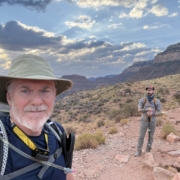The Gift of Clarity | Healthy Aging Series: S11 E3
Many years ago (now I sound like I’m writing a folk tale.)…
Many years ago, when my sons were little and Derrick was four or five years old, it was a beautiful Sunday morning and we were walking into church from the parking lot. Derrick had his hands full of I-Joe’s. That was his way of saying G.I. Joe’s. Allowing him to bring these toys made it easier for him and for us during the worship service.
Charlie, one of the Deacons, saw us coming up the walk and held the door open for us. As Derrick crossed the threshold, he dropped an I-Joe and in frustration said, “shit!” I looked up at Charlie and our eyes met, and his smile said, “We both know where he learned that.”
My siblings and I were taught how to cuss. I think my mom’s favorite word was, “shit.”
What did you learn from your parents or grandparents?
Finding Wisdom in Folktales
I’ve chosen “The Old Man and His Grandson,” as my first folktale to reflect on aging with an attitude.
I’ve used folktales before in this blog, but I want to give a reminder about what folk tales were all about. These poignant stories were typically given to a small audience sitting around a warm hearth, maybe the town elder was telling the story to teenagers and young adults. I imagine finishing the tale, letting it marinate for a few moments, and then asking, “What do you think?”
The Old Man and His Grandson (paraphrased by Mark Neese)
Many, many years ago, there was a very old man. He lived with his son, daughter-in-law, and his grandson. He had difficulty seeing and hearing as is usual for those who are getting older. He had become wobbly as he walked. As he sat at the table, he had a difficult time holding his spoon, and would often spill his dinner or breakfast on the table cloth, and sadly would even let some of it spill from his mouth.
His son and daughter-in-law were annoyed by this, so they told the grandfather that he had to sit in the corner at a table near the stove. They gave him his food in a clay bowl and often not enough. At times, he would look at the big table and his eyes would well up in tears. Once, his hands were trembling so much that he couldn’t hold the bowl and it fell to the ground and broke. His daughter-in-law scolded him, but he said nothing and he just sighed. So, they went out and bought him a wooden bowl and he had to eat out of that.
His son and daughter-in-law were sitting at the big table one morning, when the old man’s grandson, who was four years old, began to gather some of those broken pieces of bowl that had fallen onto the ground. “What are you doing there? “his father asked. “I’m making a little trough,” answered the child, “for you father and for you mother to eat from when I’m big.”
The man and his wife looked at each other for a while and then began to sob. Then they led the old grandfather back to the table, and from then on, they invited him eat with them and said to him, “Don’t worry if you spill a little on the table.”
Now stop. I’d like to jump to the end again. “The man and his wife looked at each other for a while and began to sob.”
As the storyteller, I would prime the pump with a few lessons, but I wouldn’t want to do all the work for the listeners.
I might add a couple lessons, such as:
In our moments of despair, help comes from unexpected places.
Our children are a reflection of our values.
Society is a reflection of what we value.
Stop and look at those that depend on us to see who we are.
Karma is really reaping what we sow.
If we want good karma then sow good karma.
The way we treat those that are vulnerable is the way we will be treated.
We should learn from the least.
Those that love us will save us, and we will save those that save us.
The man and his wife were really the ones that were saved.
In reality we need saved from ourselves.
We need to cry.
We need to see ourselves. We need to see ourselves the way others see us. Typically, it’s the reflections of ourselves that are our real selves.
The Gift of a Future Vision
In this fairytale, the man and his wife get a glimpse of the future. It’s a gift. What would you give to get a glimpse of your future? I think that the man and his wife were blinded by the present. The present created a sense of apathy with them. They were blinded by the mundane which led to that apathy. The grandfather had lost his voice, had lost his strength, and felt a sense of disgrace and resignation. He had become an object of scorn and it was a very small voice that woke them from that trance of the mundane. Sometimes it is that still small voice that opens our eyes to our future.
Let’s dig just a little bit deeper here.
The lesson I learned from this folktale:
Children learn how to treat people by the way you treat people. Children mimic us. They act out our values. We can tell how well we’ve done at teaching them our values by the way they reflect back to us our values, at the way they treat others.
The four-year-old in his innocence showed his parents, taught his parents, about their past and their future, and opened their eyes.
This child gave them the Gift of Clarity.
In that brief moment, they were able to see who they had been, who they were, and who they were to become.
I don’t know what kind of father the grandfather was. We don’t know what kind of tenant he was. We know that he was frail and we know that he was mistreated. My heart broke as I read this story. I cringe when I read that the daughter-in-law scolded him, but he said nothing and only sighed.
The Burden of Caregiving
I shared this folktale with a friend who cared for his father for several years. What he described was burdensome. Fortunately, they were able to hire a home-health aide, but the day in and day out care for the frail elderly can take a toll on caregivers.
Maybe in a modern world he would’ve been given a paper plate and plastic utensils, and he would have been seated at a folding table and chairs. I see him tear up as he wants to be treated with dignity, as a respected part of the family. But he says nothing.
And the moment of clarity comes when they see their grandson playing in the home, like most children play. Innocent. Unpretentious. And when asked what he is doing, he replies, “I’m making a trough for you, mommy and daddy, for when you get old.“
Without intending to teach his parents, without malice, without finding fault, the four-year-old showed them a vision of their future. It was as if they were in a trance and the trance had been broken.
The fog lifted. They saw what they had been doing and what they were teaching their son to become, and they cried. I believe it was heartfelt. They were decent people who had been acting indecently.
That’s what happens when we are in a trance and when we lack clarity. People who are overwhelmed by the mundane often turn inward and have difficulty seeing the needs of others.
That can happen to all of us. We say and do things that we don’t mean when flooded by self-pity.
We get so caught up in the here and now and before we know it, we cannot see one second one minute, one day into the future.
Maybe self-pity is the hypnotic metronome that slowly lulls us into our egocentric trance.
Holding up a Mirror
They saw themselves being cared for by a son who had been trained to provide indecent caregiving. They were creating themselves in their son. Isn’t that what we want to do? People tease me by referring to my subordinates as my clones. I suppose they are mostly kidding, mostly, but maybe there is a little truth in it. Don’t we want to clone ourselves in our children? Most of us would say, “Well, kind of.” We want our children to have all of our good qualities, but how about the bad habits and character defects we have.
Grandpa was Saved and then, He Saved His Family
In order for the grandfather to be saved from his misfortune, Mom and Dad needed saved first from themselves. Grandpa was saved by this four-year-old playing in the dirt, who then saved his son and daughter-in-law from themselves.
I know they were decent people behaving indecently because once they saw who they had become and who they were becoming, they changed. They welcomed grandpa back to the family table and treated him with dignity. When decent people receive the gift of clarity, they wake up from their trance and they change, that’s it.
We all need those moments of clarity. We all have them available throughout our lives throughout our days.
My Trance
I was recently facing a decision about a former employee. I had two options. Be decent, or be indecent. I shared the brief details with a colleague who advised taking a more business -like approach, a less generous approach.
In that moment, I saw two people in my future. One I wanted to be and one I didn’t want to be. I didn’t want to become a spiteful person, but rather I wanted to be the kind and generous person I know I am.
Your Trance
The question isn’t are you in a trance. It is, will you be open to moments of clarity, that will break through your trance, allowing you to see yourself.













